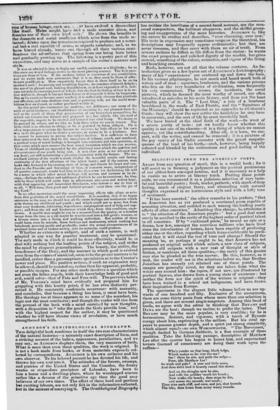SELECTIONS FROM THE AMERICAN POETS.
APART from any question of merit, this is a useful book ; for it will assist us in forming a judgment on the poetical pretensions of our eldest-born amongst nations, and it is necessary as a help to enable us to arrive at literary truth. Putting these points aside, we can recommend it as a judicious selection of very taste- ful and beautiful poetry ; fresh, tender, pathetic, with much of deep feeling, much of elegant fancy, and abounding with natural thoughts expressed in an harmonious style and with a lofty tone of sentiment.
"It has been asserted," the editor remarks in his preface, "that no American has as vet produced a continued poem capable of arresting attention, and entitled to rank among the leading poetic efforts of' other countries." Admitting this charge, he attributes it to " the situation of the American people : " but a good deal must surely be ascribed to the rarity of the highest order of poetical talent in all countries. If by "continued poem," be meant an epic or a drama, how few, amongst the countless millions who have lived since the introduction of letters, have been capable of producing either one or the other, regarding which it can confidently be predi- cated that it will stand the test of time and change? Should the meaning be, as perhaps it ought to be, that America has not produced an original mind which selects a new class of subjects, presents old subjects with a new cast of thought or style of diction, or combines all three qualities,—the rarity of this genius may also be pleaded as the true answer. Be this, however, as it may, the reader will see in the selections before us, that Brother Jonathan has scarcely yet attained one of these points. The images are generally novel, for they are taken from what the writer sees around him: the topics, if not new, are illustrated by poetical figures, also drawn from a young state of existence but neither the form nor the spirit of the writers is original—they have been trained in a school not indigenous, and have drawn their inspiration from Europe. The specimens in the elegant little volume before us are up- wards of one hundred and fifty. Exclusive of the anonymous, there are some thirty poets from whom more than one selection is given, and there are several single songsters. Among this band of bards, we agree with the editor in thinking that BRYANT and DANA are the best; though we incline to prefer the latter. That BRYANT may be the more popular, is very credible; for he is harmonious, distinct, and vigorous, with a touch of Byronic energy about him, captivating to the million. But his rival ap- pears to possess greater depth, and a quiet yet strong simplicity, which almost equals our own WORDSWORTH. "The Buccaneer," though dashed by German diablerie. is a fine example of these qualities. Take the following passage, descriptive of Matthew Lee after the spectre has begun to haunt him, and supernatual terrors (instead of conscience) are doing their work upon the ruffian— Who's yonder on that long, black ledge, Which makes so far into the sea? See ! there he sits, and pulls the sedge— Poor, idle Matthew Lee !
So weak and pale? A year and little more, And thou didst lord it bravely round this shore.
And on the shingles now he sits, And rolls the pebbles 'neath his hands; Now walks the beach; then stops by fits, and scores the smooth, wet sands;
Then tries each cliff, and cove, and jut, that bounds The isle; then home from many weary rounds,
















 Previous page
Previous page